

AN ACTION RESEARCH APPROACH:
ENGAGING PARENTS IN THE ASSESSMENT PROCESS FOR
INCREASING MATHEMATICAL ACHIEVEMENT
Lori Wiens
This action research began following a discussion my vice principal, Joe Alessandro, and I had over an article he had asked me to read in Professionally Speaking, the magazine of the Ontario College of Teachers. The article indicated that children, whose parents are involved in their children’s homework, tend to perform better in school than children whose parents do not take an active role in their education. The Ontario Curriculum, Grades 1 – 8: Mathematics (1997), similarly, indicates that studies have shown that students perform better in school if their parents are involved in their education. Parents and educators share the role of assisting students in developing their overall abilities to the fullest extent possible. It is essential then for parents to become familiar with the content of the curriculum documents. Knowledge of the expectations and assessment standards allows parents to provide more relevant and accurate assistance for their children. I hypothesized that children will demonstrate even greater levels of achievement when their parents are knowledgeable of the curriculum expectations and furthermore, are actively involved in the assessment process. My hypothesis evolved into my research question:
Will students’ mathematical achievement increase when parents become more aware of the curriculum expectations and assessment standards by becoming actively involved in the actual assessment process?
Rationale and Inquiry Plan
Although a relatively new teacher beginning an assignment in an SK - 5 rural community school, I was aware of the concerns and anxieties that many parents expressed regarding the new mathematics program. I have listened to parents voice their concerns over the content of the mathematics program, and the methods of delivering and assessing the content. These concerns, along with my personal belief in the importance of active parental involvement in education, led me to conduct my research within an area of the curriculum that genuinely concerned a significant number of parents - mathematics. After discussing my ideas with my Vice-Principal, it was decided that one strand of mathematics be the area of focus. I decided upon the Number Sense and Numeration strand as I thought this strand would be most familiar and comfortable for parents.
Inquiry Process and Outcomes
Our research project lasted approximately 7 weeks, from the initial meeting with parents, to the final testing process. Mr. Alessandro and I drafted a letter inviting interested parents to an initial meeting at the end of February to introduce the research project. Twelve of twenty-two families attended the initial meeting and one family discussed the research project over the telephone, as they were not able to attend the meeting. The purposes of this initial meeting were to introduce the research project, to define what their role in the project would be, and to gain some idea of how many parents were truly interested in becoming actively involved in the project. Following this meeting, all 13 families in attendance agreed to participate in the project. We now had two groups of students: a group of 13 participants (10 girls, 3 boys) and a group of 9 non-participants (3 girls, 6 boys).
Our next step was to decide the format of the research. We were aware that parents needed to be informed about the learning expectations in the Number Sense & Numeration strand of the Mathematics curriculum. A second meeting took place in late March to accomplish this task. Three of the 12 families were unable to attend this meeting but requested that the handouts be sent home with their children the following day. At this meeting I provided each family with a Number Sense and Numeration sample question including the overall and specific expectations. As well, I provided an assessment rubric and a sample of work from each of Ontario’s four levels of achievement.
I quickly but carefully walked parents through the sample question and discussed the learning expectations for the question and the criteria necessary for each of the four levels. I provided opportunities for questions and comments at this point. One of the major concerns of parents at this meeting was how much time each of the assignments would entail and how much time families would be given to complete each assignment. We had decided in advance that assignments would be given out on a Tuesday and would be due one week later. Parents seemed relieved to know that enough time would be given for each assignment.
I conducted an in-class baseline test within the Number Sense and Numeration strand the day after the second meeting. Students were asked to work independently to complete the question as best they could. The only assistance that I provided was reading the question to students and assisting them in interpreting the question. Students in the participating group scored an average of Level 2.4 on the baseline test, whereas students in the non-participating group scored an average of Level 1.72 on the baseline test (See Appendix A).
The first assignment was sent home the last week of March following the completion of the baseline test. Students in the participating group were each given an assignment question which included the strand, the expectations, and an assessment rubric as well as a second page which included sample answers from each of the four levels. Students in the non-participating group were each given the same assignment question that included the strand and the expectations only. This process continued for 4 weeks (total of 4 assignments). On each assignment, parents in the participating group were asked to indicate at which level they thought their children were performing and to provide any comments that they wished to include. I marked the assignments handed in by students in the non-participating group.
Interestingly, 92.3% of students in the participating group completed all of the research assignments, whereas only 11.11% of students in the non-participating group completed all of the research assignments (See Appendix A). It appears that at the very least, assignment completion is positively affected when parents become actively involved in the learning process. Following the completion of the baseline test and the four at-home assignments, all students were given an in-class follow up test which consisted of four mini-questions very similar to those found on the at home assignments.
The base line test, 3 of the 4 at home assignments, and the final test scores were recorded and analyzed by Mr. Alessandro and myself. Assignment # 4 was not counted and the marks were not recorded as part of the research project due to overwhelming confusion with respect to the expectations of the question. Our results indicated that students in the non-participating group demonstrated an overall group average improvement rate of 14.03%. Students in the participating group demonstrated an overall group average improvement rate of 30.44%.
Once the assignments and tests had been completed we allowed the participants a few weeks to unwind while we formulated a questionnaire for parents to complete based on their experiences during the research project. We wanted to design the survey to provide us with crucial information and insight into the worth of our research project by allowing parents to reflect and comment on all aspects of the research project. A questionnaire of 11 questions was drafted and sent to participating parents to voluntarily complete and return to the school (See Appendix B).
Eight of the thirteen participating families completed and returned the questionnaire. The survey yielded some interesting feedback. There seemed to be relative consistency with respect to the comments that parents provided. When asked if parents felt that this project had helped them to "better understand the new provincial curriculum and the expectations", seven of eight families indicated that the research project did help them understand the curriculum and the expectations. A few families stated that they thought the "expectations are set way too high!" and that "there seems to be a lot more required to complete the answer than when I went to school". When asked how this project has been of benefit to parents, most participants shared similar responses ranging from, " It gave me a clearer understanding of the new curriculum," to, "It was good to make us aware of what was being taught in the classroom," to, " Having more knowledge about what they are doing in class allows me to help my child more at home." Based on this evidence, it appears that the research has had a positive impact on the parents and students alike.
Concerns and Reflections
While immersed in the research project, many concerns surfaced which warrant discussion. The first concern arose immediately when I began assessing the initial assignments completed by students in the non-participating group. I realized that my expectations would be more demanding than the expectations of parents. There were some differences in the assessors’ expectation levels: however, the levels assigned to the work of students in the participating group were relatively consistent with the baseline scores and the prior knowledge I had of my students’ performance. To exercise some degree of control over this issue of assessment leniency, perhaps I should have also assessed assignments completed by students in the participating group. It may also be that a rotation schedule be implemented so that the parents and I assess the weekly assignments on alternate weeks. This concern will be carefully considered as I continue to pursue a similar research focus with my Grade 2 students this school year.
Secondly, students in the non-participating group generally appeared to have received very limited or no at-home assistance and it was difficult to control or measure the extent to which students in the participating group received assistance, including on-going tutoring and coaching. Thirdly, I questioned whether or not the length of the research would warrant valid results. I am confident that the results of this research project have provided me with valuable insight into the significant relationship that exists between parents’ knowledge of the curriculum expectations and assessment standards, and students’ level of achievement. However, I will continue to pursue this research project more extensively this school year, keeping in mind the above mentioned concerns, to ensure greater reliability and validity.
Final Thoughts
Having concluded my first action research project, I now find myself speculating about where this inquiry has taken me. I have gathered the evidence necessary to support my initial belief that parents play a crucial role in the achievements of their children. I have observed how active parental involvement increases work completion rates, instills within children positive attitudes towards mathematics and the desire to succeed, and provides increased opportunity for the development of the skills and concepts. In becoming more comfortable and knowledgeable of the curriculum expectations and standards, parents have been able to provide their children with more accurate and useful assistance. As an educator, this extensive examination of my students’ achievements in mathematics heightened my awareness of the many different achievement levels in my classroom. In turn, I was forced to re-evaluate the effectiveness of my teaching and to modify the delivery and content of my mathematics program to meet the needs and learning styles of all of my students. I have discovered that parents are as concerned as educators are but require the knowledge to provide appropriate assistance to their children. I believe that encouraging parents to assume an active role, not only in the delivery of the content, but also in the assessment process, will be the motivating force that compels parents to assist or continue assisting their children academically. I plan to continue to pursue this issue through action research during the upcoming school year with my Grade 2 students and their families.
Acknowledgements
I would like to extend sincere appreciation to my former Vice-Principal, Joe Alessandro, for introducing me to action research, and for his encouragement and support during this project, and also, to my Grade 2 students at Port Rowan Public School and their supportive families for their dedication to this project.
References
Ontario Ministry of Education and Training. (1997). The Ontario Curriculum, Grades 1-8: Mathematics. Toronto: Ontario Ministry of Education and Training.
Appendix A
ACTION RESEARCH PROJECT
Received Help |
No Help |
|
|---|---|---|
Number of Students |
13 |
9 |
Baseline Average |
2.4 |
1.72 |
% of Assignments Completed |
97.43 |
55.55 |
% of assignments that received Baseline or better (All assignments counted) |
92.3 |
40.74 |
% of assignments that received Baseline or better (Only completed assignments counted) |
94.73 |
73.33 |
% of students who completed all assignments
|
92.3 |
11.11 |
% of assignments that bettered Baseline score (All assignments counted) |
79.48 |
25.92 |
% of assignments that bettered Baseline score (Only completed assignments counted) |
81.57 |
46.66 |
Appendix B.1
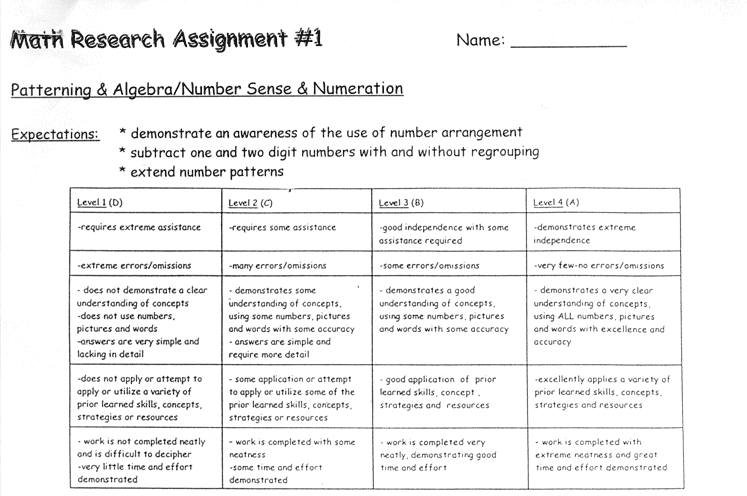
Appendix B.2
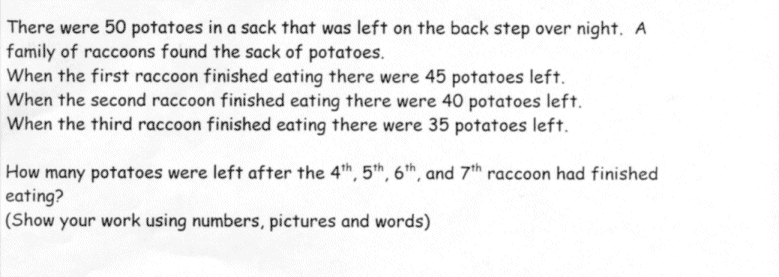
Appendix B.3

Appendix B.4
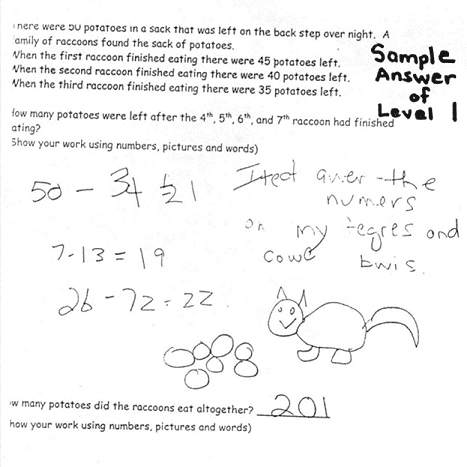
Appendix B.5
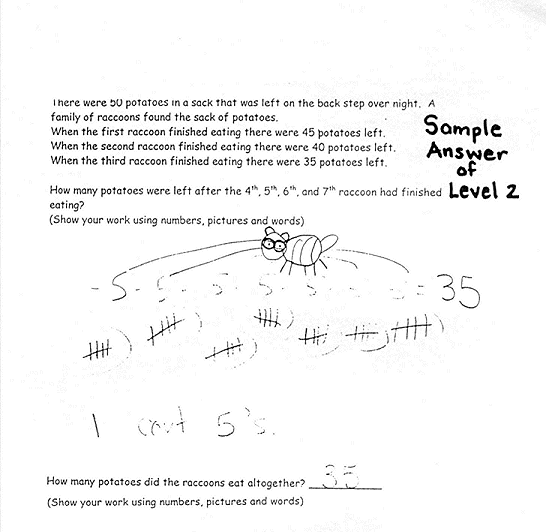
Appendix B.6
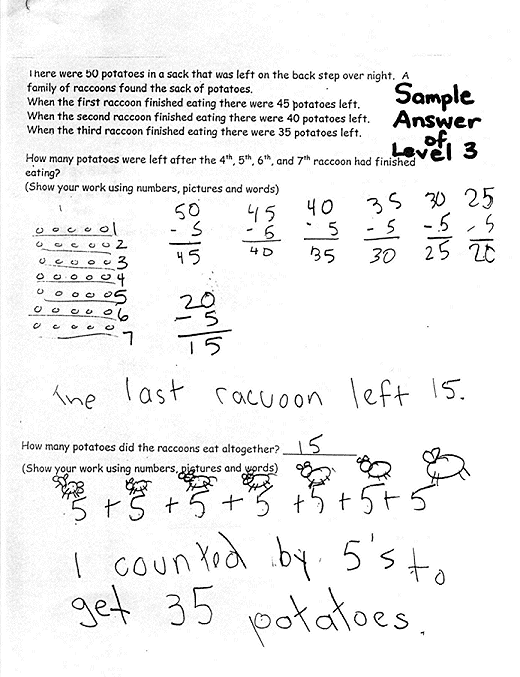
Appendix B.7
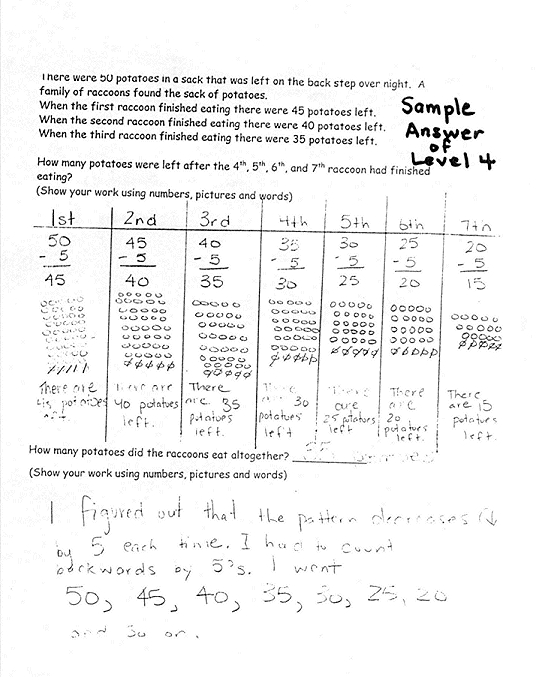
Appendix C
Grade 2 Math Research Project
Sample Parent Survey
- Did this project help you as a parent, better understand the new provincial curriculum and the expectations?
- Did you spend more time, less time, or about the same time as you normally would helping your child with these assignments?
- Did some assignments require more assistance than others?
- Did you find the information nights to be of benefit to you?
- What would you change about the information nights to make them more beneficial to parents?
- Do you believe this project has been of benefit to your child?
- Did your child accept your help readily, or did they show some resistance?
- How has this project been of benefit to you as a parent?
- How did you feel when the initial assignment came home? (ie: Did you
Are there any ways in which you feel the project could be improved? - Additional Comments:
Bibiographical Note:
 Name: Lori Wiens
Name: Lori Wiens
Current Position:
Primary/Junior teacher with the Grand Erie District School Board teaching Grade 2. Lori has experience as a Grade 1, E.S.L. and Learning Resource Teacher.
Academic Background:
Lori’s post secondary education began at the University of Waterloo where she obtained an Honours Bachelor of Arts degree in Sociology. She continued her studies at the Faculty of Education, University of Ottawa.
Current Research Interests:
Interested in researching techniques and strategies to be used in preparing Grade 3 students for the EQAO provincial testing, beginning in the early primary years.
Email Address: lorie.wiens@granderie.ca
Mailing Address: Port Rowan Public School, 51 Ellis Street, Port Rowan, Ontario, N0E 1M0
